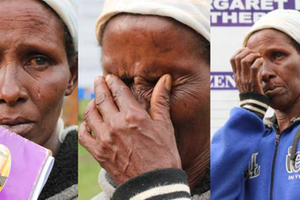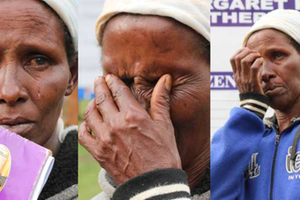
Kenya Medical Practitioners, Pharmacists and Dentists Union Coast region chairman Niko Gichana and branch Secretary-General Ghalib Salim (right) address the press at the Hotel Sapphire in Mombasa on October 26, 2024.
Medics in Coast region have rejected the newly launched public health insurance scheme, demanding that its implementation be stopped.
The healthcare workers claim that the Social Health Insurance Fund (SHIF) is not working and both doctors and patients are suffering.
Through the Kenya Medical Practitioners, Pharmacists and Dentists Union (KMPDU), the medics insisted that the new scheme that is run by the Social Health Authority (SHA) has been rejected by most healthcare facilities that had been contracted by SHA and patients are being forced to pay out-of-pocket to access services.
Medical facilities have continued to experience hitches in making claims on the SHIF portal despite assurances by Health Cabinet Secretary Deborah Barasa that the glitches had been sorted out, they claimed.
Speaking during the union’s third Annual General Meeting at Hotel Sapphire on Saturday, Coast KMPDU Secretary Ghalib Salim criticised both SHA and SHIF as “white elephants,” asserting that doctors and patients alike are struggling with an inadequate and ineffective health insurance.
“We are treating patients but cannot access treatment ourselves under SHIF. This scheme is inactive, and citizens are paying out-of-pocket to access even basic services,” Dr Salim said.
He said the new system limits critical services, including single monthly visits for dental care priced at Sh950, and restricts procedures such as dialysis and chemotherapy to once a month.
Under SHIF, all workers are expected to contribute 2.75 per cent of their salaries towards the new health fund.
Under the defunct National Health Insurance Fund (NHIF), which was replaced by SHIF, Kenyans were deducted between Sh150 and Sh1,700 a month for salaried workers and Sh500 for the self-employed. Kenyans earning Sh20,000 were deducted Sh750, while those getting Sh50,000 paid Sh1,200.
Those earning Sh100,000 and above were deducted Sh1,700. The maximum contribution of Sh1,700 for those earning Sh100,000 or more was eliminated under the new scheme.
Under SHIF, those earning Sh20,000 will be deducted Sh550 with Kenyans getting Sh50,000 paying Sh1,375.
Kenyans earning Sh100,000 will be deducted Sh2,750 and those getting Sh200,000 will pay Sh5,500. Those earning Sh500,000 will pay Sh13,750 while Kenyans getting Sh1 million and above will pay Sh27,500.
According to Coast KMPDU Chairman Niko Gichana, the inadequate and trouble-ridden health insurance scheme has left healthcare workers and the public in a precarious situation.
“There used to be comprehensive medical insurance for seconded employees in the Ministry of Health. Now, without proper pre-authorisation, our members are forced to pay out-of-pocket,” Dr Gichana said.
He further pointed out that, out of the six coastal counties, only Kilifi and Taita Taveta had fulfilled agreements to honour doctors’ rights.
Many doctors have faced unfulfilled promotions and delayed salaries since the return-to-work formula was signed on May 8, the union officials said.
The union leaders also addressed the plight of intern doctors, many of whom have endured financial hardship due to salary delays since August.
Dr Collins Olondo, an intern medical officer, highlighted these issues, stating: “We started working on August 5, 2023. Today, it’s October, and we have not been paid. We don’t know when or how much we will be paid.”
In an urgent call to action, Dr Salim and Dr Gichana urged elected leaders to address doctors' grievances and reinstate the NHIF and the comprehensive medical cover, which they claimed provided far better healthcare options for medical professionals and the public.
“If our comprehensive medical insurance cover is not restored, we will have no choice but to take the next step,” Dr Gichana said, without elaborating on what this might be.
The union warned that, unless prompt action was taken to address doctors' grievances, the country's healthcare system risked facing an even greater crisis, with shortages of trained personnel as more doctors seek opportunities abroad.








